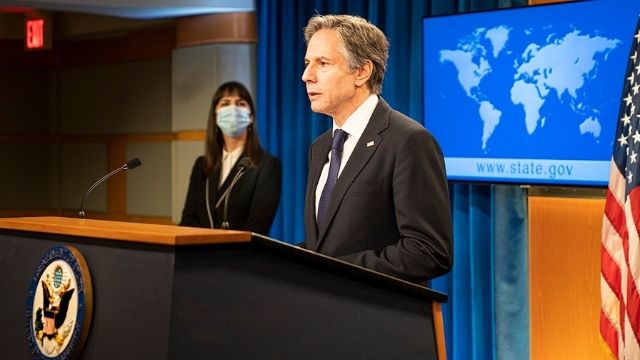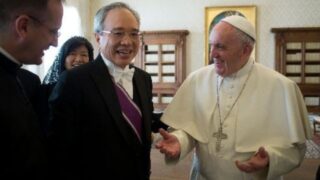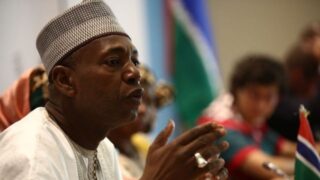Freedom of religion has been recently placed by the U.S. at the top place in a hierarchy of human rights. This will change, announced Secretary Blinken.
by Marco Respinti


On March 30, US Secretary of State, Anthony Blinken, announced what some saw as a fundamental change in American foreign policy. The US, Blinken said presenting the Department of State’s 45th annual report on human rights in the world, will “repudiate the unbalanced views” that placed religious liberty at the top of a hierarchy of human rights. “There is no hierarchy that makes some rights more important than others,” Blinken said.
Media saw it as a strong criticism of the precedent Administration, and of Blinken’s predecessor as Secretary of State, Mike Pompeo, who had repeated time and again that religious liberty was at the top of a hierarchical pyramid of human rights. Pompeo’s approach created the conditions for promoting the Ministerial to Advance Religious Freedom, held twice in Washington, D.C. and a third time online due to COVID-19 (rather than in Warsaw, Poland as planned), accompanied by regional meetings, and the admirable work of Sam Brownback as Ambassador-at-Large for International Religious Freedom.
Is really religious liberty just one among a myriad of other human rights, some of which may deserve more attention than freedom of religion or belief? I respectfully tend to disagree.
Surely, there are several human rights that must be protected and granted to all. It is much appreciated that a world power such as the US renews its commitment to put human rights and the top of its priorities in foreign policy. How different human rights stand with respect to each other is a debated philosophical question, but it also has very practical implications.
Particularly at a time when the list of human rights tends to constantly add new ones, they may enter into conflicts with each other, and trying to defend all of them in the same way may lead to intractable impasses. I believe that yes, some basic human rights are more basic that others: that is why we call them, etymologically, “fundamental,” i.e., foundational. They lay the foundation upon which others are erected. Others depend on them; they do not depend on others. They serve as a rationale, a paramount, and the ultimate criterion of evaluation and order.
The most basic human right is of course the right to life. A dead person does not have rights, and we only talk of human rights in relation to the living. Homicide is the most basic violation of human rights. But the first political human right is religious freedom, since it makes us free to address the most basic questions of human life, indeed the core premise of the human condition itself. This is neither a sectarian statement, nor an endorsement of faith as such. FORB (freedom of religion or belief) also protects the freedom not to believe. It grants humans the right to address the ultimate questions of human life without constraints, deciding “for” or “against” the existence of God, “for” or “against” any religion, or all of them. From this, all the rest comes. This first political human right stands at the foundation of all the others.
As American citizens, presumably Secretary Blinken and Secretary Pompeo agree on the fact that this principle is enshrined (the word is particularly appropriate) in the Bill of Rights and the First Amendment of the US Constitution, whose aim is to preserve individual and corporate liberty from any possible interference by the state. These documents indicate religious liberty as the first political human right of a US citizen. Immediately after, the First Amendment mentions the political rights to “freedom of speech, or of the press; or the right of the people peaceably to assemble, and to petition the Government for a redress of grievances.” That of the human rights in the US Constitution is a crowded podium, but the golden medal is bestowed upon religious freedom.
I wonder whether a competent Ambassador-at-large for international religious freedom will be appointed again, and the Ministerials to Advance Religious Freedom will continue. The US have involved other countries, who have appointed their own Ambassadors-at-large for religious freedom following the American model, and have co-sponsored the Ministerials. It would be strange if the US, having incited other countries to co-operate, would now abandon them.
The March 30 Blinken speech accompanied the publication of a strong-worded report on human rights, which severely criticizes China, particularly for the genocide waged by the CCP against Uyghurs and other Turkic peoples in Xinjiang, which its non-Han inhabitants call East Turkestan. Blinken assured the world that the strong US commitment on denouncing human rights abuses in China will continue. Even before being confirmed by the Senate as Secretary of State, Blinken had publicly agreed with Pompeo to call “genocide” these CCP crimes.
This is good news, but one wonders whether the rights of Uyghurs and several other persecuted minorities in China and throughout the world will now be protected without references to the basically religious nature of the persecution vested on them. If this would be the case, misunderstandings on what the persecution is all about will be created and perpetuated, to the detriment of the very human rights Blinken vowed to defend.









